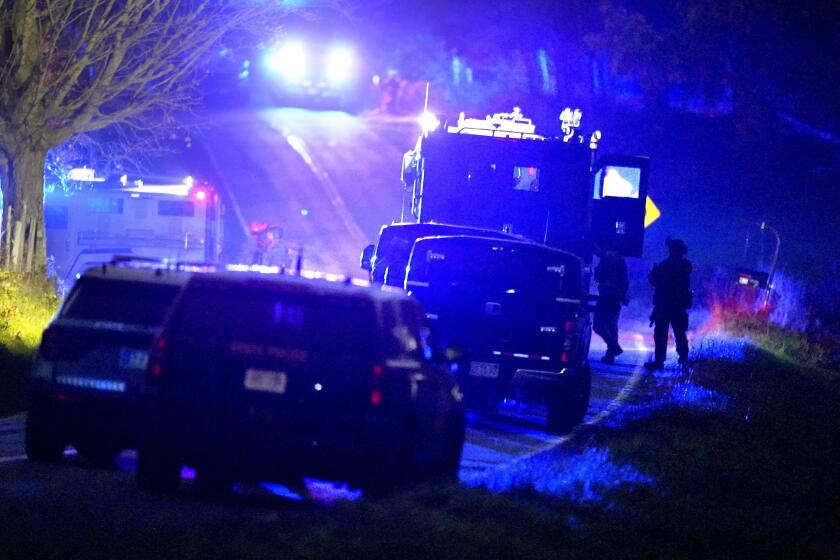Keep your enemies closer
Should the next president talk to the country’s enemies?
Barack Obama stresses that he would. Hillary Rodham Clinton equivocates but basically would be averse to premature talks with our adversaries.
John McCain, the presumptive GOP nominee, did not address the issue in his recent speech to the Los Angeles World Affairs Council. But the Bush administration has been clear about its approach: Rather than engage our enemies, it has preferred to revile and isolate them. That’s what it did to Iraq before invading it and to North Korea before joining six-party talks to rid it of nuclear warheads, and what it still does to Iran. And there has been no effort to engage Raul Castro, Cuba’s new leader.
One former president, whose name has frequently come up in the presidential campaign as an object of near-veneration, talked to the country’s enemies. He was Ronald Reagan, and we can learn much from his approach.
Reagan enjoyed publicly denouncing the Soviet Union. At his first news conference as president, he railed against that country’s communist leaders, who reserved “the right to commit any crime, to lie, to cheat” and believed in “treachery, deceit, destruction and bloodshed.” On another occasion -- in one of his most famous speeches -- he said they were “the focus of evil in the modern world.”
During his eight years in the White House, Reagan dramatically raised U.S. military spending, invaded Grenada, deployed a new generation of missiles to our allies in Europe and aided the mujahedin in Afghanistan and the Contras in Nicaragua. In March 1983, he announced a new strategic defense initiative -- Star Wars.
All this is well known. What is not as well known is the other Ronald Reagan, the one who persistently sought to negotiate with the men who ran the evil empire. Housed in the Reagan Presidential Library and Museum is a trove of evidence concerning his efforts to talk to the nation’s enemies, including a series of letters that he wrote to Soviet leaders, often in his own hand to underscore their authenticity.
What did Reagan say to Leonid Brezhnev, Yuri Andropov and Konstantin Chernenko? He told each of them that, notwithstanding the differences between the United States and the U.S.S.R., there was much to talk about. Common problems could be discussed across the ideological chasm. The “fact that neither of us likes the other,” he said in a January 1984 speech, “is no reason to refuse to talk. Living in this nuclear age makes it imperative that we do talk.”
To Brezhnev, Reagan wrote in April 1981 that he was lifting the grain embargo on the Soviet Union and seeking dialogue. “The peoples of the world, despite differences in racial and ethnic origins, have very much in common. ... Should we not be concerned with eliminating the obstacles which prevent our people from achieving their most cherished goals?”
And when Andropov, Brezhnev’s successor, died in February 1984, Reagan quickly wrote to the new Soviet leader, Chernenko, “I have no higher goal than the establishment of a relationship between our two great nations characterized by constructive cooperation.” In another letter, Reagan said the two nations should look “for specific areas in which we can move our relationship in a more positive direction.”
Within his administration, Reagan’s desire to talk to the enemy encountered bitter opposition. The president’s close friend, Secretary of Defense Caspar Weinberger, hated the idea. But Reagan pressed forward. The U.S. had to be strong, Reagan insisted, but the purpose of its strength was to talk.
As Reagan’s determination to talk to the country’s main adversary grew, he came to understand the evil empire in ways that surprised him. The Soviets, he learned, were frightened of his actions. Indeed, we now know from British and U.S. intelligence reports that the autumn of 1983 was the second-scariest time in the Cold War. That’s when the U.S. military exercise Able Archer tested command and communications procedures for firing nuclear weapons in wartime, raising fears in the Kremlin that Reagan might be preparing a surprise attack.
Reagan was astonished. He wrote in his autobiography: “Three years had taught me something surprising about the Russians. Many people at the top of the Soviet hierarchy were genuinely afraid of America and Americans. Perhaps this shouldn’t have surprised me, but it did.”
Was his new insight correct? He began asking visiting emissaries: Were the Soviets really afraid of U.S. power? Again and again, he was told that they were.
He had heard, Reagan wrote Chernenko in March 1984, that the Soviet leader hoped history would recall “us as leaders known to be good, wise and kind. Nothing is more important to me, and we should take steps to bring this about.”
Nothing came of these initiatives. Aging Soviet leaders did not know how to interpret the president’s private overtures when his public rhetoric was often so hostile and his actions so portentous. Reagan, however, was not dissuaded by the rebuffs out of Moscow. He wanted to talk to Soviet leaders, but they kept dying on him.
But on March 6, 1985, when a young and dynamic Soviet leader -- Mikhail S. Gorbachev -- was crowned in the Kremlin, Reagan was eager to try anew. A briefing book was prepared for Vice President George H.W. Bush and Secretary of State George Shultz to use in their talks with the new Soviet leader in Moscow after Chernenko’s funeral: “We know this is a time of difficulty,” read the briefing book. “We would like it to be a time of opportunity.”
When Bush and Shultz met with Gorbachev, Shultz looked him directly in the eye and said, “President Reagan told me to look you squarely in the eye and tell you, ‘Ronald Reagan believes this is a very special moment in the history of mankind.’ ”
Six months later in Geneva, Reagan stepped off a plane to meet the new Soviet leader. He acknowledged in his autobiography that his “juices were flowing. I wanted to get started. In a very real sense, preparations for the summit had begun five years earlier, when we began strengthening our economy, restoring our national will and rebuilding our defenses. I felt ready.”
From the outset of his presidency, Reagan grasped that strength was a backdrop for talks but that little could be achieved without talking to the country’s key adversaries. The enemy might be evil, but common ground might be found. The adversary might be evil, but change might come. Political systems might be oppressive, but they were not forever. One had to have confidence in one’s values. One had to have patience and perseverance. One had to talk. Talking to your enemy did not mean giving away the kitchen sink; it meant gauging his nature, taking his measure and determining what next to do.
And if you were wise and lucky, you might wind up with an astonishing interlocutor, as was the case with Gorbachev. “As we shook hands,” Reagan wrote in his memoir, “I had to admit ... there was something likable about Gorbachev. There was warmth in his face and his style.”
And the two men, to the surprise of contemporaries, moved the Cold War to a peaceful end.
Talking to your enemy makes sense -- that is a legacy of Ronald Reagan.
More to Read
Start your day right
Sign up for Essential California for news, features and recommendations from the L.A. Times and beyond in your inbox six days a week.
You may occasionally receive promotional content from the Los Angeles Times.






